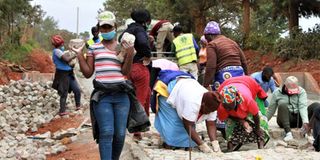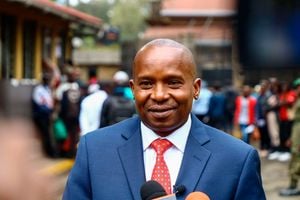Kenya underperforms in global gender-sensitive test

Women under the Kazi Mtaani program work on the Mavoko-Mua Road in Machakos County on August 17, 2020. This program is among measures taken by the Kenyan government during the Covid-19 period that are gender-sensitive.
What you need to know:
- Kenya is among African countries that have made little efforts in addressing women’s urgent needs while combating Covid-19.
- Out of the 55 African countries, 52 have at least one gender-sensitive measure.
- Only three out of the nine measures taken by the government are gender-sensitive and are limited to social protection and mitigating violence against women they include probe rise in teenage pregnancies and GBV, Kazi Mtaani and National Hygiene Program.
Kenya is among African countries that have made little efforts in addressing women’s urgent needs while combating Covid-19.
United Nations Development Programme (UNDP) has used Covid-19 Global Gender Response Tracker to monitor status of governments across the world in effecting gender-sensitive policies relating to social protection, violence against women, economic and fiscal and labour market including unpaid care.
Out of the 55 African countries, 52 have at least one gender-sensitive measure.
In Kenya, only three out of the nine measures taken by the government are gender-sensitive and are limited to social protection and mitigating violence against women.
Of the three is President Uhuru Kenyatta’s directive to National Crime Research Centre (NCRC) in July, to probe rise in teenage pregnancies and sexual and gender-based violence (SGBV).
Labour market
Others are the Kazi Mtaani and National Hygiene Program (NHP) announced by Mr Kenyatta on April 25, and National Safety Net Program (NSNP) under which more than one million Kenyans benefited.
While NHP ensured the female were part of the beneficiaries, NSNP prioritised giving cash to the women in benefitting households.
Meanwhile, Egypt leads with the most gender-sensitive policies that cut across freeing women from violence, advancing their social protection and promoting their participation in the labour market.
Of the total 38 Covid-19 responses, 21 are gender specific. On addressing violence against women, for instance, the government, in April, launched ‘Stop the Bullying, Corona virus is not a crime’ campaign to raise public awareness about the social stigma associated with Covid-19.
Further, National Council for Women (NCW) and the National Committee for the eradication of Female Genital Mutilation (FGM) launched a social media campaign dubbed ‘Protect her from FGM’. It aims at educating the public on the physical, psychological and legal consequences of the cut.
Social protection
In regard to advancing women’s social protection, in March, Prime Minister Mostafa Madbouly issued a decree giving exceptional leave to pregnant female employees or those caring for children aged below 12. He also decreed issuance of leave to female employees tending to children with disabilities.
The order emphasised on allowing all working mothers to do their family duties without losing their jobs.
Additionally, the Ministry of Social Solidarity announced increasing the monthly income for rural women leaders from EGP 300 (Sh2,074) to EGP 900 (Sh6,221) per month.
On promoting their participation in the labour market, the Ministry of Communication and Information Systems (ICT) launched a package of educational program for women. It involves training women on new technological tools to help them e-commerce and e-market their products.
Meanwhile in Zimbabwe, eight of the 10 Covid-19 responses are gender-sensitive. However, all the eight measures aim at tackling violence against women.
Movement restrictions
In courts, SGBV is treated as an urgent matter. Out of the halls of justice, essential are GBV services that they cannot be limited by the travel or movement restrictions. Further, the Ministry of Finance has availed resources to support increased awareness on SGBV.
In Rwanda, out of the nine actions taken by the government, five are gender-sensitive. They relate to protecting women and girls from violence as well as ensuring their access to sexual and reproductive health services is undisrupted.
The government reviewed its Community-Based Health Insurance, facilitating immediate use of the scheme upon subscription. In the previous regulation, insurers who include the poorest whose premiums are subsidised by the government, could only access services through the scheme, one month after registration.
Women, therefore, enjoyed the ease of receiving family planning, antenatal and postnatal care and childbirth professional care during the pandemic.
Other poorly performing countries are Tunisia with only six gender-sensitive measures out of 22. Senegal, two out of 13, Cameroon, two out of seven and Liberia, one out of five.





